

Get 4 FREE video lessons sent to your inbox!
GETTING STARTED
ON THE PIANO
Success! Check your email!
Let’s face it: staying committed to the piano is hard. Piano practice motivation can be lacking some days. And stuff like work, family, and other commitments can sap all your musical time and energy. So when life gets tough, how do you keep going?
Everyone — even the most virtuosic pianists in the world — must practice to get good. And here’s the kicker: you’re never “done” learning piano! There’s always a new skill to master, a new song to learn. This can be exciting and overwhelming at the same time.
If you want to get good at piano, and you’re in it for the long haul, this is the article for you. We’ll discuss motivation, learning piano as an adult, share our tips, and tell you exactly what you need to practice.
Get piano tips and news delivered straight to your inbox every week. Subscribe for free.
Understanding the psychology of motivation can help you optimize your practicing. Motivation is a well-studied topic and there are several ways to understand it:
Intrinsic motivation is motivation that comes from within. Such as: “I want to practice piano because I enjoy the challenge of learning and perfecting pieces.”
Extrinsic motivation comes from an outside source. Such as: “I want to practice piano because there’s a gig coming up that pays well. The better I play, the more tips I’ll get, so I better practice!”
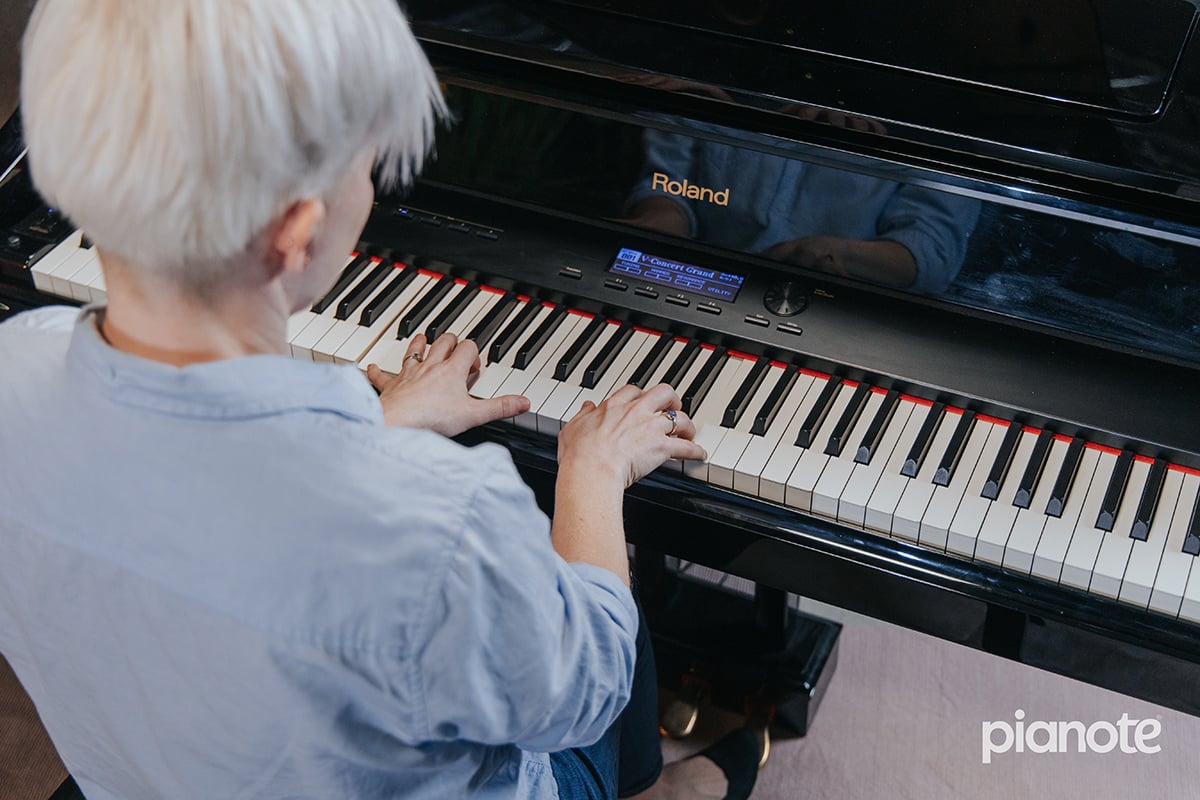
In general, intrinsic motivation is more effective in the long-term. After all, gig tips can vary, and audiences may not enjoy your music as much as you hope. Which isn’t something you can control.
But if you intrinsically enjoy learning how to play piano, you’ll keep going no matter what the external factors.
Flow is a state of consciousness where a person feels fully engrossed in what they’re doing. Time passes quickly and the rest of the world falls away. The flow state can happen among creatives and athletes, and it’s more likely to happen when:
Most importantly, though, the activity must be meaningful to you.
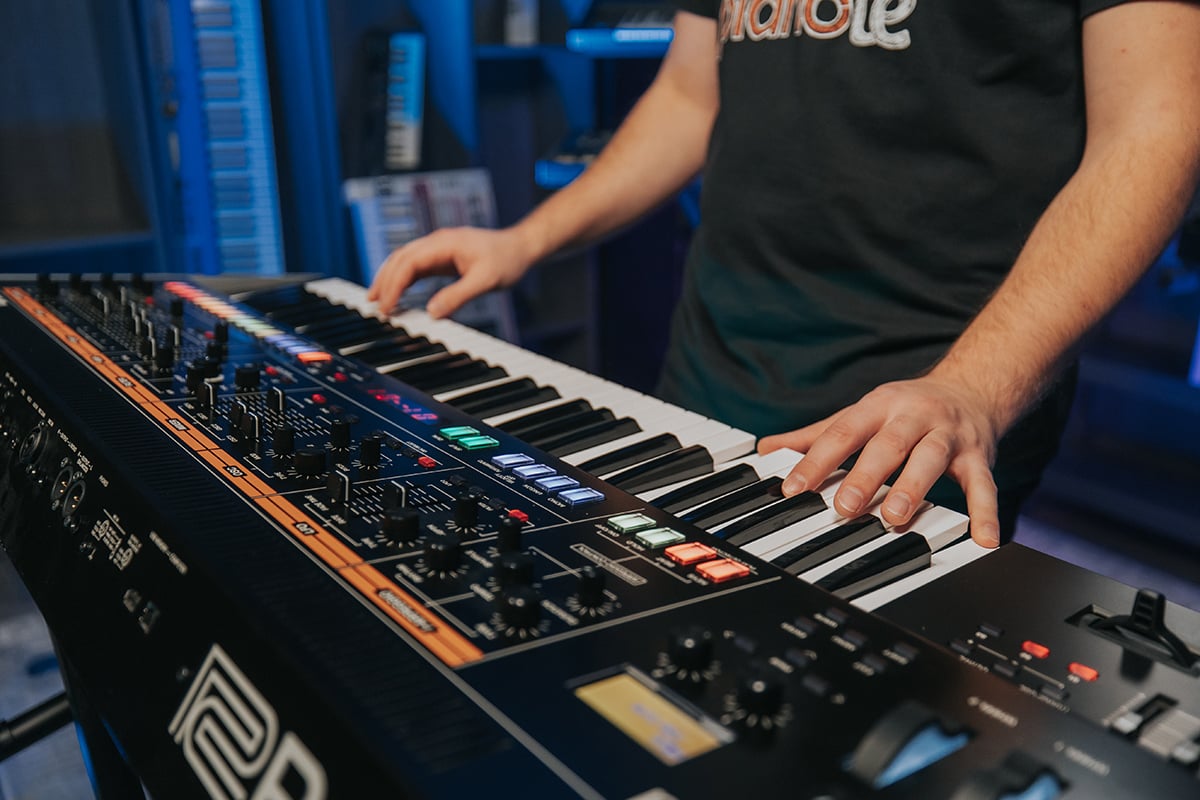
This is a method of goal-setting we believe works well for musicians. Make SMART goals that are specific, measurable, attainable, relevant, and time-bound.
When we set goals that are vague, it’s difficult to gauge how well we’re achieving them. Having specific goals that are measurable and time-bound helps us focus our energy. And having goals that are relevant and attainable gives us the intrinsic motivation and the skills to achieve them. Keep reading to learn about SMART goals.
There are unique challenges to learning piano as an adult, but age can also be an advantage. Yes, watching child prodigies is intimidating, but many adults can learn quickly and attain a high level of mastery.
Adults tend to be intrinsically motivated. Whereas children may need a push from their parents to keep practicing, adults have made a conscious decision to learn a skill.
Grown-ups have experienced of school, work, and responsibilities. As an adult, you know that you have to put work in to get a result. Kids are still learning this.
Because they’ve been alive longer, adults have had more exposure to music. You probably know a lot more about music, at least intuitively, than the kid next door. You have preferences, tastes, and existing skills. Like singing, perhaps!
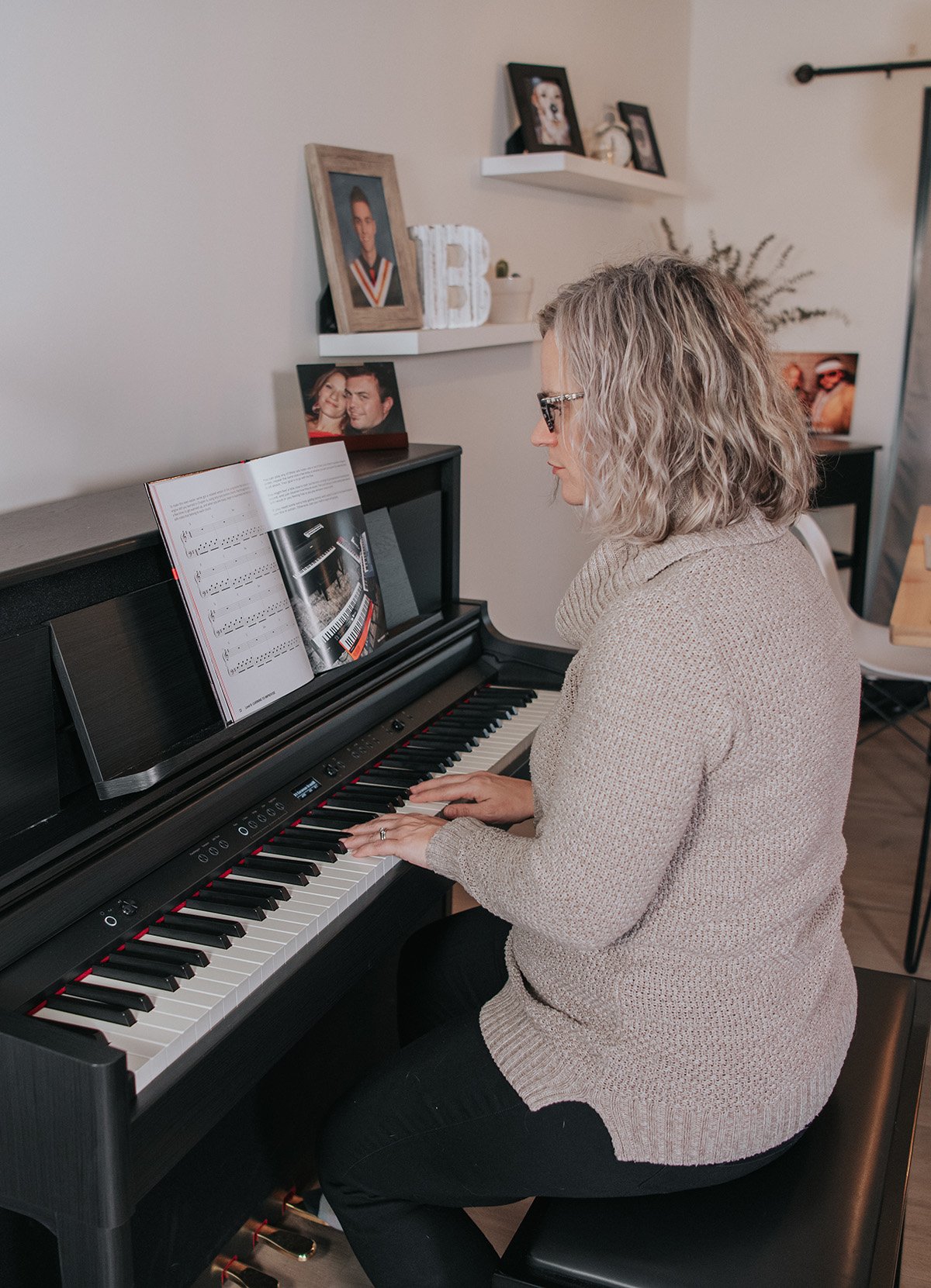
Many adults discover that the most difficult thing to get past is hand independence. You KNOW in your head what your hands are supposed to do, but you just can’t do it!
This is normal and expected. And you can master hand independence. It does require practice though. You can find a library of free hand independence exercises here right on The Note.
So what’s a piano player to do when they’re in a rut? Luckily, we have six tried and tested tips for you:
It’s natural to feel ambitious when you start something. You tell yourself that you’ll practice an hour a day, every day, and you begin imagining a future in which you’re a piano maestro!
But it’s important to be realistic. You’re human. There will be days when you won’t want to practice. So, it helps to plan for these circumstances in advance. Learn to expect them. You’ll be kinder to yourself if you treat yourself like a human with flaws rather than a superhuman with limitless drive.
The feeling of not wanting to practice is normal. It just means you need to consider other means of motivating yourself. Such as…
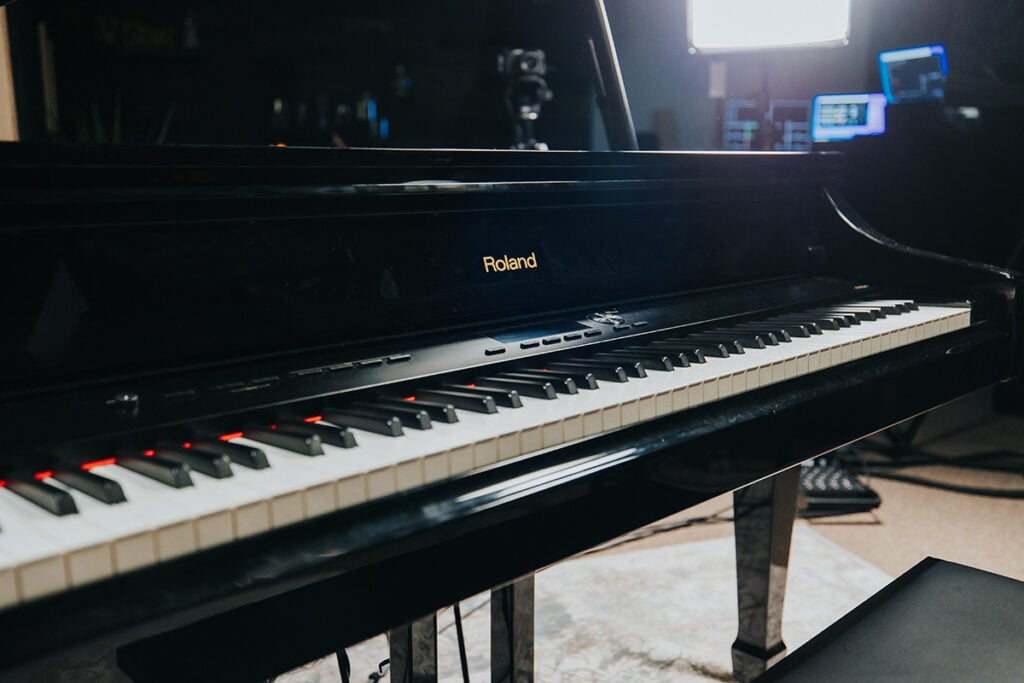
When you’re feeling disheartened by the piano, remember why you learned how to play it in the first place. Perhaps…
Listening to the music you want to play one day can also motivate you to practice.
So find your why, write it down, and return to it often.
Here’s the thing. Nobody ever practices the piano and then walks away thinking, “Oh, I wish I hadn’t practiced piano today.”
Chances are you’ll feel good after your practice session. Wonderful things happen to your brain when you play piano (take a look at this TED-Ed video to see what we mean). Your brain is better after playing music, and you can use that to “hack” your motivation.
So, after your practice session, ask yourself how you’re feeling. Then connect this feeling to practicing. “I can feel this great again. I just need to practice to recreate this feeling!”
Now, technique isn’t why (most) people want to play piano. It’s tedious, boring, and sometimes even frustrating. But trust us: drilling your scales, chords, and arpeggios will make you a better player. You’ll play faster, smoother, and better, which will motivate you to play more!
If the thought of practicing scales feels like the thought of eating your least liked vegetable, try these:
What are your piano goals this week? This month? This year? Be specific and set SMART goals.
SPECIFIC
“My goal is to play ‘Clair de lune.’”
MEASURABLE
“My goal is to play ‘Clair de lune’ at the correct tempo.”
ACHIEVABLE
“I have played pieces slightly easier than ‘Clair de lune,’ so it’s a realistic piece to learn.”
RELEVANT
“I want to play ‘Clair de lune’ for my mother on Mother’s Day because it’s her favorite piece.” (Hint: this is your “why”!)
TIME-BOUND
“I will learn to play ‘Clair de lune’ at the correct tempo by Mother’s Day.”
Writing stuff down helps. You can download this journal page or, better yet, use the Pianote Practice Planner.
You might not think that a five-minute practice session counts, but it totally does! Just five minutes a day makes a difference, and everyone has five minutes. In fact, practicing five minutes a day every day is better than practicing for an hour once in a blue moon.
So, the next time you have five minutes, don’t open Instagram, don’t check Facebook. Instead, ask yourself, “Can I fit in five minutes of piano instead?”
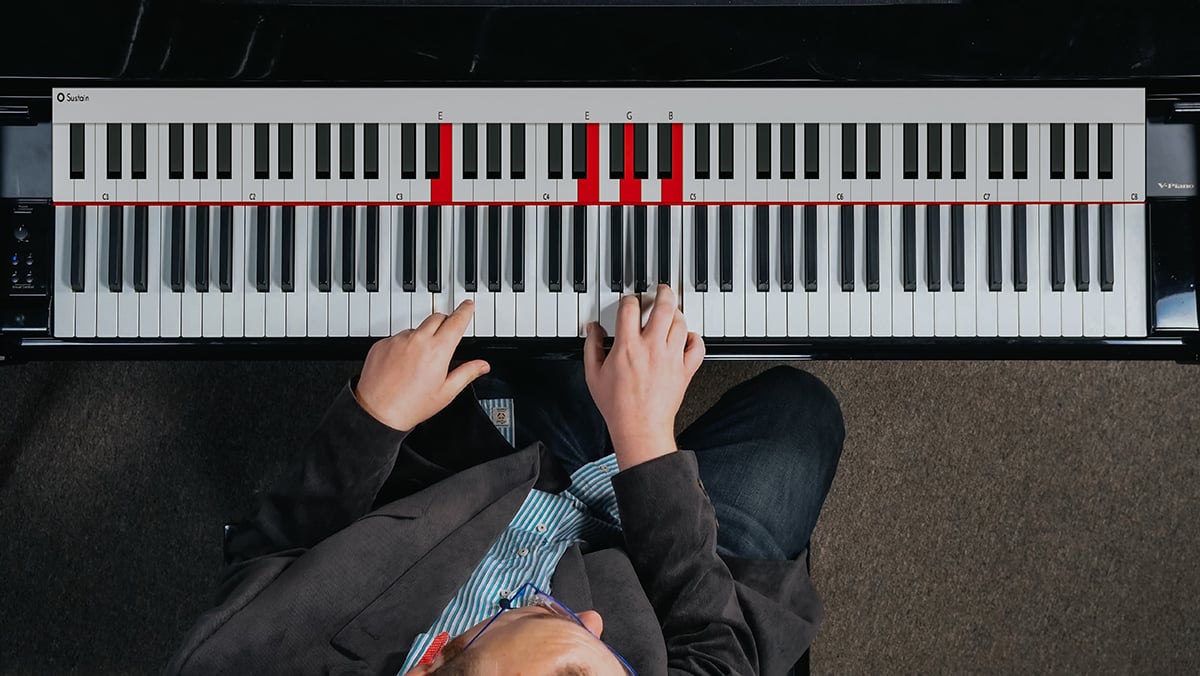
When you’re struggling with piano practice motivation, it’s sometimes difficult to figure out what you should practice.
“What should I practice?” is a very common question that we get! These are our suggestions no matter how long our practice is:
Warming up helps you get into the piano-playing mode. It also gets your blood flowing and prevents injury. Make sure you have perfect piano posture and do some stretches before you start!
Like eating your vegetables, you do need to practice technique. To avoid boredom, make your drills more song-like. And make them relevant by practicing in the same key as a song you’re working on.
More tips to make technique more enjoyable include:
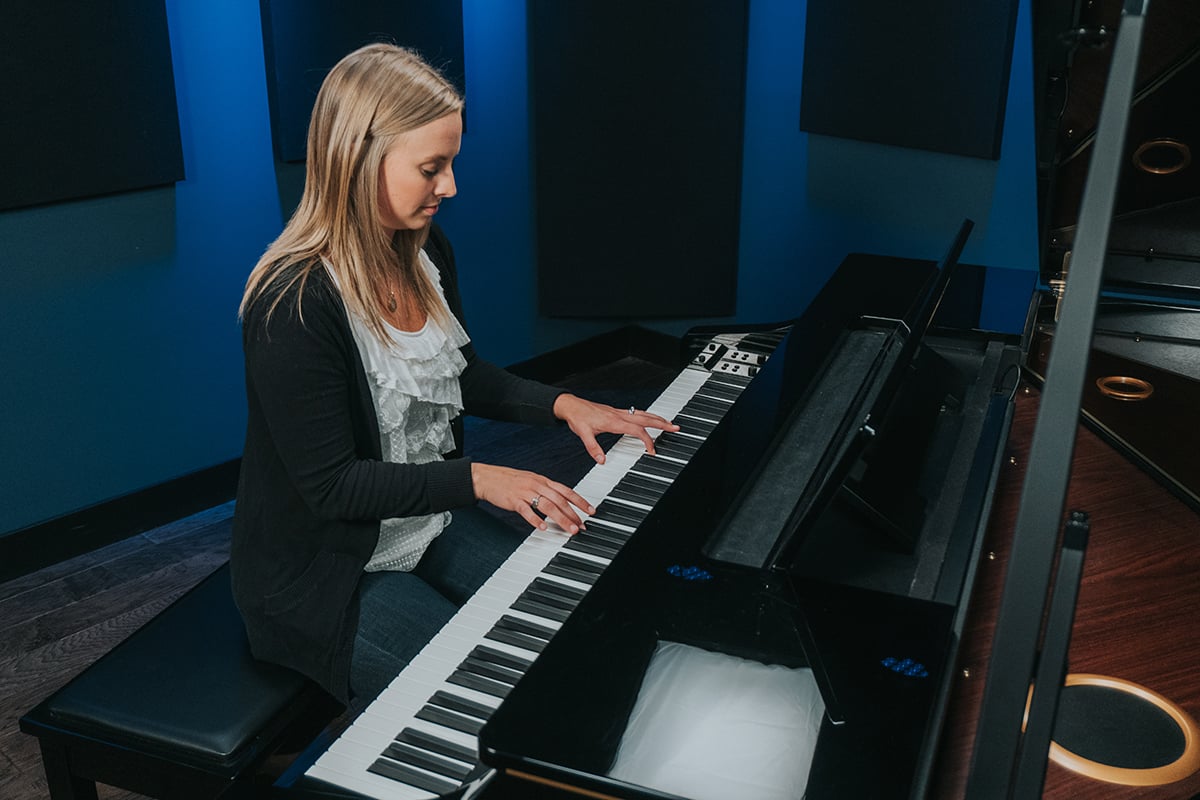
Technique is the foundation to piano playing. If technique has been holding you back from playing the songs you love, check out Piano Technique Made Easy with Cassi Falk. This course, free with your Pianote membership, will take you through all 12 major and minor keys as you master scales, arpeggios, chords, and more.
Songs are the reason we play piano, so by all means make time for them!
It may be helpful to pick a small handful of songs to focus on at a time. It also helps to have songs from a diversity of genres, so you can cycle through styles if you get bored of one.
After a session of difficult practice, it’s sometimes nice to play something you’re confident with. So reward yourself and have fun!
Improvisation exercises are a good way to round out your practice session. Relax, free your mind, and see what you can come up with.
Take a look at some of these free and easy improv lessons:
We hope we’ve inspired you to keep practicing piano, perhaps even for life!
Piano practice motivation is hard. Some days will be easier than others. Be kind to yourself. You won’t be perfect.
And remember: have fun! Piano should feel good. If it doesn’t feel good, think about your why, review your goals, and see if there’s anything you can add to your practice routine to make the experience serve YOU.
Happy practicing!
Charmaine Li is a Vancouver writer who has played piano for over 20 years. She holds an Associate diploma (ARCT) from the Royal Conservatory of Music and loves writing about the ways in which music—and music learning—affects the human experience. Charmaine manages The Note. Learn more about Charmaine here.
/marketing/pianote/lead-gen/getting-started/coach.webp)
/marketing/pianote/lead-gen/getting-started/logo.webp)
By signing up you’ll also receive our ongoing free lessons and special offers. Don’t worry, we value your privacy and you can unsubscribe at any time.
We use cookies for traffic data and advertising. Cookie Policy »
/marketing/pianote/lead-gen/digital-chords-and-scales/blog-exit-m.png)
Grab a FREE E-Book with every Chord and Scale you’ll need to play your favorite songs.
Enter your email and we’ll send your book instantly.
Don’t worry, we value your privacy
and you can unsubscribe at any time.


enjoying the lesson?
Get 4 FREE video lessons sent to your inbox!
GETTING STARTED
ON THE PIANO
Success! Check your email!